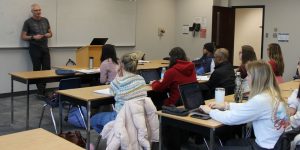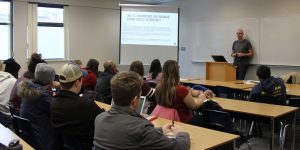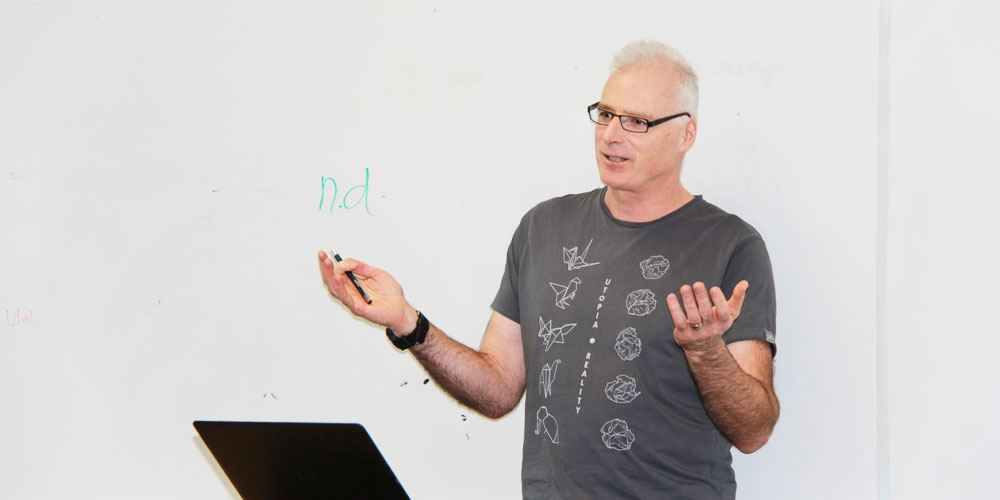Daniel Keyes is an Associate Professor at UBC Okanagan, teaching courses in English and Cultural Studies with an emphasis on film and television studies. In 2007 he served as the founding chair of the Cultural Studies program, the first new program on the Okanagan campus.
Dr. Keyes shares some insights on his teaching and research practices here at UBC Okanagan.
Give us some insights on your research and its impact.
UBC has given me the opportunity to explore local phenomenon like whiteness and red face in the Okanagan while also exploring more global issues relating to digital ephemerality that arise with Web 2.0. With both the local and the global, I am able to explore questions of power and representation.
I have co-edited a book, with Dr. Luis Aguiar, an anthology on Whiteness in the Okanagan that I trust will have a greater impact than my own publications on this topic that have appeared in academic journal articles. This anthology’s varied perspectives on what my co-editor refers to as ‘smug whiteness’ in the Okanagan will furnish a public venue for thinking about race in the Okanagan in terms of the legacy of the Okanagan colonial history of land dispossession of the Sylix peoples and the tilt of this region towards neoliberal entrepreneurial thinking. The book, White Space: Race, Privilege, and Cultural Economies of the Okanagan Valley was published in December 2021 by UBC Press.
My research on digital ephemerality explores how while we live in an age of digital abundance where we can capture representations of everything, we also inhabit an age of profound and often lopsided digital loss where non updating software platforms and rapidly improving hardware means that technology that was cutting edge not more than five years ago is obsolete. Paying attention to the politics and complexity of digital loss is a global issue.
What most excites you about your field of work?
I find research of all varieties exciting. Whether it is sitting in a basement archive paging through decrepit newspapers or interviewing an interactive documentary director about her work that will disappear from the Internet in 2020, the thrill of research is in glimpsing something out of sight and bringing it to light. What challenges me in this process is the writing and documenting. The painstaking efforts to improve expression and ensure documentation is accurate remains a worthwhile challenge.
How did you know you wanted to be a professor?
I began teaching as a graduate student at York university with seminars of 2nd year undergraduate students studying an introduction to Western drama. These students tended to be the first in their families to attend post-secondary education. A turning point for me with these students was seeing how looking at a moldy racist melodrama like Dion Boucicault’s The Octoroon (1859) could ignite passions as students saw many of the play’s creaky representations of gender, race, and class casting a long shadow into their daily life.
What kind of learning experiences do you offer your students?

Dr. Daniel Keyes teaching a Cultural Studies course in the fall of 2019
My 3rd year Television studies course has a “make tv” assignment where groups of students create 30-second television ads for a client. In 2018, our client was the head of marketing for the car share service Modo, based in Vancouver. She was keen to post ads on social media launching a new product aimed at recruiting inexperienced drivers to Modo. Students met with her to learn about the product. They developed their ads by first pitching their ideas and then developing them into a storyboard, rough-cut, and final cut while receiving constructive criticism from the marketing head and classmates. This assignment gave students a glimpse of how broadcast regimes and notions of audience’s expectations influence commercial broadcast. Students also gained fabulous hands-on media and teamwork skills that will serve them well after graduation.
You supervise in the MA in English program. What opportunities do you offer for graduate students?

Dr. Daniel Keyes teaching a Cultural Studies course in the fall of 2019
I like to think of supervision as a way of guiding a junior scholar to develop and hone their focus and analytical skills to generate innovative and unique research. I had an incredible supervisor for my PhD, Robert Wallace, at York University. He allowed me to intellectually roam, to take risks, and to pose questions that had not been asked while situating my thinking in an established body of research. I have adopted his style of supportive, yet not adverse to risk supervision.
My research in the Okanagan looks at how race and space function in the contemporary, modern and colonial Okanagan. I am excited to support and do archival research into how settler-invaders exalt and frame the Okanagan as Edenic pastoral, but I am also excited to do research on how contemporary Okanagan media keeps alive this moribund fantasy. Another project that I am currently working with Catalina Brinceno at the Université du Québec à Montréal is a small project exploring the shelf life of online databases devoted to documenting and accessing Canadian film and television. This project is part of a larger study of how in this era of seemingly infinite storage in the cloud the digital promise of longevity fails.
I’m excited to support research into either of these two relatively narrow areas of research along with the broader field of Media and Cultural Studies.
